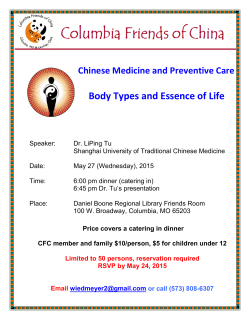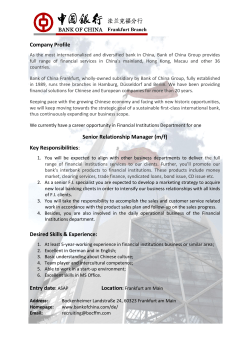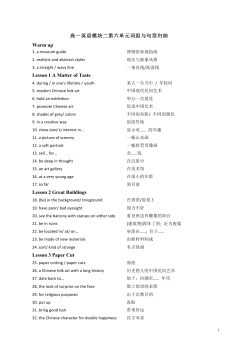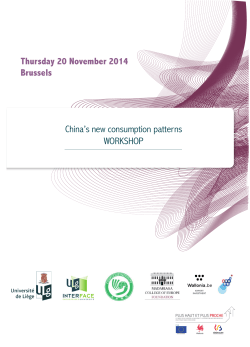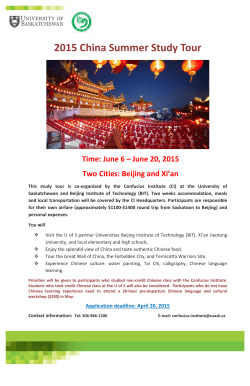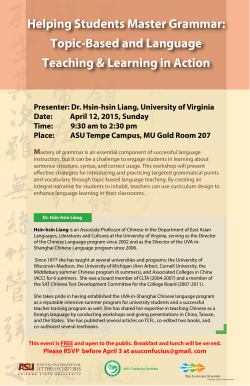
Fudan University - Office of Student Affairs
Fudan University International Summer Session 2015 Session Duration: July 4 - August 1, 2015. Application Deadline: April 30, 2015 F Fudan University International Summer Session 2015 udan University, located in Shanghai, is one of the oldest and most selective universities in China, and is a member of the C9 League, Universitas 21 and Association of Pacific Rim Universities (APRU). It is composed of four campuses, including Handan, Fenglin, Zhangjiang, and Jiangwan. Fudan University comprises 17 schools, 69 departments, 70 bachelor's degree programs, 243 master degree programs, 35 disciplines and 154 subdisciplines authorized to confer Ph.D. degrees. Fudan University enrolls over 30,000 full-time students, including over 3,000 international students. Fudan University has a high-level research faculty of over 2,700 fulltime teachers and researchers, 37 academicians of the Chinese Academy of Sciences and the Chinese Academy of Engineering, 105 special professors and lecture professors of Cheungkong Scholars Program. Fudan University has 10 teaching hospitals, such as Zhongshan Hospital and Huashan Hospital, integrating medical service, education and research. These hospitals have state-of-theart equipment and sophisticated technology, over 900 highly qualified staff, creating a good environment for medical education. PROGRAM OVERVIEW F udan University International Summer Session 2015 (July 4 - August 1) will provide a 4-week course study and cultural experience to international students from all around the world. Students will have the opportunity to get to know China, experience Shanghai and be part of Fudan community. Fudan University students will also have the chance to participate in the program and communicate with international students. This program will help you achieve multicultural understanding, establish a global vision, and get connected with peers from around the world. Fudan University International Summer Session 2015 offers 19 content courses, 3-level Chinese language courses as well as historical and cultural visits. The content courses will cover a range of topics in History and Culture, Society and Politics, Business and Economy, and Global Issues of the 21st Century. Each content course is designed as a 39 academic-hour course, and each level of Chinese language is designed as a 40 academic-hour course. Students can choose one or two content courses and Chinese language course is optional. After a successful completion of the course study, students will be awarded a program certificate and an official transcript from Fudan University. Students who wish to transfer Fudan International Summer Session credit back to their home institutions are advised to consult in advance with the appropriate academic authorities at the institutions. You will find Fudan and Shanghai wonderful places to learn and grow during the summer. Our faculty, staff and student counselors all look forward to welcoming you to the Pearl of the Orient. Fudan University International Summer Session 2015 02/03 02/03 History and Culture China through the Camera Lens, 1920s-1990s Course Introduction Ancient Chinese Thought Chancellor's Research Fellow (Lecturer) Department of Asian Studies University of Edinburgh UK Ancient Chinese Thought China through the Camera Lens, 1920s-1990s History and Culture Globalization and China’s Youth Culture Introduction to Modern Chinese History CAI Qinghua Spirit of Chinese Art Associate Professor School of Philosophy Fudan University China Chinese Culture and Business Practices Society and Politics Chinese Media and Politics in the Context of Globalization History of Diplomacy in Modern China Social-Mobile Journalism Chinese Financial Markets China's Modern Economy: What Happens and Why? Business and Economy Doing Business in China International Business International Investment Law Energy and Environment Global Issues of the 21st Century Financial Crisis in the Global Context Globalization and Developing Countries Global Environmental Governance Globalization, International Political Economy and Development Elementary Chinese Chinese Language HUANG Xuelei Intermediate Chinese Advanced Chinese ★ Courses are organized by Academic Affairs Office. Tel: 86-21-65643027 Email: jxyj@fudan.edu.cn Fudan University International Summer Session 2015 06/07 This course aims at giving a general account of Chinese classical thoughts and helping students to understand Chinese tradition and culture. It offers an introduction to some ancient schools of thought, mainly Confucianism and Daoism. These schools of thought have tremendous and lasting impact on the formation of the Chinese mind and will continue to shape the Chinese outlook on life in the future. Representative thinkers from each of these schools will be selected and introduced. Students are required to closely read the classical texts and some fundamental philosophical issues will be discussed. The comparative approach is highly encouraged in this course. This is an interdisciplinary course that deals with history, cultural studies, and film studies. Students will view and analyze seven films produced in China between the1920s and 1990s and learn how to use visual sources to understand historical phenomena. More specifically, the course will examine a number of important themes in modern Chinese history. The themes include class, gender, family, nation, revolution, tradition, and the people. The primary objectives of the class include: (1) to provide students with the materials and useful theoretical approaches to understand these important issues in modern and contemporary China; (2) to acquaint students with knowledge on the development of Chinese film history; (3) to sharpen students’ skills in analyzing and interpreting visual materials. This course consists of twelve sessions. Each session includes an introduction, a film screening, and discussions of the film and reading materials. In order to sharpen their critical and interpretive skills, small groups of students will make fiveminute presentations in class to analyze reading materials and films. Globalization and China’s Youth Culture Introduction to Modern Chinese History SI Jia Associate Professor Department of History Fudan University China This course will introduce students to a series of reforms carried out by different social and political groups in China in the 19th and early 20th century, when the last imperial dynasty was in imminent danger of falling apart. The course also examines the international relations between China and other major countries during the first half of the 20th century, helping students understand the historical significance of events before the eve of revolutionary Republican era, and the discourse of China’s modernization after the establishment of New China in 1949. SHEN Yipeng Assistant Professor Department of Language and Culture Studies Trinity College USA This course deals with cultural and social interactivity of the past three decades between the historical deepening of China’s post-socialist reform and the vicissitudes of the culture of Chinese youth. In the four weeks of the course, each week is dedicated to one of the four distinctive and interrelated topics: food, sexuality, nationalism, and environment. In the week of “food”, the course explores the cultural politics of food by examining works such as Lu Wenfu’s The Gourmet and Ang Lee’s Eat Drink Man Woman. In the week of “sexuality”, the course ethnographizes recent Chinese dating culture ranging from urban night life, to the “leftover women” phenomenon, to the cultural sensation of If You Are the One (Fei Cheng Wu Rao). For the topic of nationalism, I analyze the ways the narration of the nation in Internet literature, film (e.g., Zhongguo Hehuoren), and television (e.g., Beijingren Zai Niuyue) gives rise to various public discourses of contemporary China, and defines social subjects such as netizens, media elites, and state-sponsored filmmakers. Last but not the least, the discussion of the “environment” week pivots around how young cultural workers engage environmental challenges China faces during its high speed development. Through the forms of documentary and feature films, these cultural workers reflect upon issues such as sustainable development and the balance of humanity and nature. The subthemes include ecoaesthetics, the relationship between water and politics, and the bioethics associated with the changing urban space. Spirit of Chinese Art LU Yang Professor Department of Chinese Language and Literature Fudan University China This course is to discuss the inner spirit of Chinese art, and trace its relationship with traditional Chinese philosophy and culture. The course covers Chinese mythology, aesthetics, painting, film, as well as personal practice of Chinese painting and calligraphy. The goal of the course is to enhance students’ understanding of Chinese art and promote their aesthetic taste. Finally, the course will also give a map to show how “French Theory” travelled in China. Fudan University International Summer Session 2015 08/09 Society and Politics Chinese Culture and Business Practices PAN Tianshu Professor Department of Sociology Fudan University China ZHU Jianfeng Assistant Professor Department of Sociology Fudan University China Chinese Media and Politics in the Context of Globalization With a focus on the cultural dynamics of the Chinese marketplace, this course addresses a range of topical issues from the implications of globalization for everyday life in the context of unprecedented transformations, to the rise of entrepreneurship and consumerism in contemporary China, and to the relevance of values and morals for business practices. The key goal of this course is to provide a set of conceptual tools and a new perspective that will help students better describe and understand the local social world around you. In learning this new perspective, students will develop a critical, even “skeptical” view toward superficial explanations of take-for-granted practices by replacing common sense understanding of interpersonal interactions with an uncommon sense about the links between individual experiences, structural forces and particular marketplaces. Welldocumented case studies and business ethnographies will be woven into in-class discussions as a way of grounding theory in marketing practices. Course readings will be arranged in weekly units around specific thematic issues. Discussions of the case study materials will be accompanied by presentations of the instructors’ research related to the application of anthropological, sociological methods of inquiry to business practices in different field settings. SHEN Guolin Associate Professor School of Journalism Fudan University China This course introduces students to the background of China’s political institution and culture and provides an overview of the relationship between China’s media and politics in a global context. By the end of the course, students will have acquired a broad perspective of China’s political communication and gain familiarity with China’s media system and its political consequences. Four general topics will be explored: media and China’s revolution; media policy; trajectory of media reform; media and international relation. For each topic, two lectures and one seminar will be conducted. Students will be divided into several groups, each of which will give a presentation on each topic. Fudan University International Summer Session 2015 10/11 Business and Economy Social-Mobile Journalism Jeff SOUTH In this course, students will examine the impact of social networking tools and mobile devices on news reporting. We will study social media platforms around the world, from Twitter, Facebook and YouTube to Weibo, Renren and Tudou. We will look at how journalists are using those tools, as well as cellphones and tablets, to produce, distribute and promote news content. We also will examine how social and mobile media have empowered citizen journalists to report the news. Students will apply these theories and concepts by using their cellphones to create content (text, photos and videos) and attract and engage an online audience. Chinese Financial Markets Associate Professor The Robertson School of Media and Culture Virginia Commonwealth University USA ZHANG Xiaorong History of Diplomacy in Modern China LIU Yongtao Professor Center for American Studies Fudan University China This course is designed to provide students with basic historical facts and figures about Chinese diplomacy. It is intended to give an introductory survey of Chinese diplomacy ranging from 1949 when the People’s Republic of China was established to the early 21st century. The course is devoted to a general overview of Chinese diplomacy from 1949 to the present in chronological way. Taking history metaphorically as a mirror and a text, the course examines major events, clues, and doctrines in China’s diplomacy at different phases in this part of the history. It also examines selectively China’s relationships with some countries in order to help students understand how Chinese foreign policy is performed and evolved empirically. The course will prepare students for a more meaningful understanding and appreciation of Chinese perspectives and approaches to international relations/affairs. At the completion of this course, students should be able to know some basic historical facts or data about Chinese diplomacy, and more importantly, to realize how the ideas and practice of diplomacy in modern China unfold in changing social and political contexts. Fudan University International Summer Session 2015 12/13 Associate Professor School of Business Management Fudan University China This course aims to provide students with an understanding of how the Chinese financial markets originated and developed, what reforms have been done, the Chinese characteristics, and the challenges and difficulties in future reforms. Starting with a comprehensive introduction, the course covers the major financial markets in China, including the central bank and the banking system, the security market and the foreign exchange market. Each market will be an individual topic, for which the instructor will review the fundamental concepts and theories, explain the history and facts, compare the domestic system with the international system, present examples and cases, and finally talk about the future reforms. HE Xiyou Associate Professor School of Economics Fudan University China Doing Business in China International Business The purpose of this course is to help students understand the dynamics of the business environment and business culture in China, and to help them develop their potential for doing business in China, especially regarding the direct investment and local operation in China. The course will cover: (1) What are special points of the Chinese business environment? 2) How to understand and approach the Chinese business culture? 3) How to formulate entry strategy in China? 4) How to operate local business and expand it in China? 5) How to integrate the Chinese business with the global strategy? The course content will focus on the business environment analysis, investment strategies formulation and business model transformation. The first part of the course introduces the background of international business, and the second part provides the basic knowledge of international business, followed by discussions about the environmental challenges for international business. On the basis of these three parts, the fourth part provides basic framework for understanding international competitiveness. The fifth part of the course focuses on using and deepening those analytical tools in the context of specific problems and situations. The last part deals with some emerging issues in the field of international business, including Multinational Corporations (MNCs) in China and survival strategies for local companies in emerging markets, the international expansion of companies from emerging markets, for instance, China. ZHAO Youzhen Associate Professor School of Business Management Fudan University China International Investment Law China's Modern Economy: What Happens and Why? LI Zhiqing Lecturer School of Economics Fudan University China This course is an introductory course for students being interested in China’s economic development. It will cover the retrospect of China’s economic short history after 1949, the transition from planning controlled system to socialist market-oriented economy, and the introduction of what is happening for current China’s economic development, along with main economic topics facing modern China. The course will consist of readings in China’s economic history and modern economy and the associated China’s culture along with student presentations and a term paper. LIANG Yong Associate Professor School of Law Fudan University China Fudan University International Summer Session 2015 14/15 This course introduces the fundamental system and main principles, particularly the legal systems and the practice related to inbound investment and outbound investment of China after the Reform and Opening Up in 1978, as well as the interactions among foreign investment laws, other domestic laws, and international investment agreements. This course highlights case studies on prominent issues of investment practice involving China, focusing on investment dispute settlement mechanism. It aims at helping students achieve "knowing the law", "abiding by the law" and "applying the law". ZHU Qi Assistant Professor School of Business Management Fudan University China st Global Issues of the 21 Century Financial Crisis in the Global Context In this course, we will focus on why the financial crises had repeatedly occurred, how costly they are to the domestic and global economy, how different countries at different historical episodes dealt with them with common or their own unique politico-economic means and measures, and what is the implication for the financial crises to become globally contagious and in particular its ramifications for the Chinese economy that has been assumed immunity until most recently. YANG Xin Professor Department of Environmental Science and Engineering Fudan University China CHEN Hong Lecturer Department of Environmental Science and Engineering Fudan University China Energy and Environment This course aims to provide an interdisciplinary introduction to the principles of energy, air pollution, globe climate change that help students understand the importance of various natural processes and human activities that shape the modern Earth and lead to global environmental change. We will also discuss the energy crisis, alternative energy, the promising of nuclear energy, the air pollution of different energy sources, and the scientific bases for global change assessment and policy measures. Students will be exposed to the primary scientific literatures and scientific presentations. By the end of this class, students should have the knowledge of the energy and environment and try to find the proper way to solve those problems. Fudan University International Summer Session 2015 16/17 Nicolas FOUCRAS Professor Department of International Relations and Political Science University TEC de Monterrey Mexico Globalization and Developing Countries This course is designed to specifically address questions and concepts in the realm of international economic and political orders. The approach will focus on the ability for developing countries to be part of the global economy and will analyze the way they use to take advantage of the globalization to be able to consolidate the national building process. The course will also deal with multiple topics related to the globalization and its externalities for developing countries: international trade, regionalism and alliances, multinational firms, foreign direct investment, tax havens, culture and globalization, the role of civil society, environment, natural resources, food sovereignty, protectionism, etc. Global Environmental Governance Globalization, International Political Economy and Development Comments from Previous Students FALSAL HANNAH REBECCA (UK): Summer Session is a fantastic experience. Attending the Summer Session at Fudan is great for exploring Shanghai. The staff students of Fudan University are very welcoming, friendly and helpful. Summer school is a good way to meet people from all over the world. Rasmus KARLSSON Kamil SHAH In a time of great power rivalry but also global cooperation, this course examines new and old forms of environmental governance at both the national and international level. Taking China as its natural starting point, the course looks at what role China could play in driving the global transition to sustainability. The course is primarily focused on climate change but seeks to offer a more general introduction to the environmental challenges facing humanity in the 21st century. By taking the course, students will not only learn about environmental sustainability but also develop a deeper understanding of how science influence policy and how international regimes are designed, negotiated and implemented. This course explores international political economy (IPE) in an era of globalization. Students will gain an understanding of how the contemporary global economy is shaped by transnational forces and flows, and how these impact on people’s lived experiences. The course begins by thinking about globalization and development in historical context, and by critically reflecting on various approaches to understanding the global political economy. We move on to examine the increasing financialization of the global economy and transformations in the international division of labor, including the impact of such changes on development outcomes and experiences. We examine the role of the state in an era of globalization and consider whether transnational corporate power and trends in global and supranational governance have eroded the policy sovereignty of nations. A further key set of questions concerns debates around contemporary social crises related to the global political economy. In this light, we study the sources of the instability in the international financial system, and consider what might be done to deal with such systemic problems. We examine the global political economy of agriculture taking account of current debates and conflicts related to the politics of food, land and environment. We also enquire into the lived experiences of laboring and surviving “informally” within the global economy. The course concludes by reflecting on transformations and key debates in global governance including the impact of emerging market economies and alterglobalization movements. Fudan University Senior Lecturer Department of Political Science Umeå University Sweden Lecturer School of Political Science and International Studies University of Queensland Australia International Summer Session 2015 18/19 VEDELAGO MICHELLE MARIE (USA): Despite growing up in China, taking part in the Fudan International Summer Session was one of the best decisions I have ever made. The program offered a good balance of Chinese language and content courses, which were very interesting seeing as they were being taught from a Chinese perspective. Moreover, the Chinese language courses were very engaging which made it one of my favorite parts of the program. Nonetheless, Shanghai is one of the greatest cities to be in to not only experience a part of China, but to watch modernization happen at first hand. ISMAIL MOHD ARIF BIN (Malaysia): I live in the greenery Fudan campus, surrounded with such a vibrant atmosphere of Shanghai. It is a great environment for me to immerse new culture and broaden my perspectives as well. COLE ZACHARY ALLEN (USA): About my courses, I really enjoy Service Marketing in China class. I find it really interesting how service based companies must adapt to the Chinese consumer. I'm in level 3 Chinese which is a bit difficult for me because I have only taken one year of Chinese previously. But I'm surviving and actually doing quite well. DANG HIEU (Vietnam): The courses are fun and informative, the dorm life is nice, and I spend most of my free time eating and exploring the city. KANG HARAM (Canada): Life is very different from home, but I am really enjoying my stay in Shanghai. I spend my free time trying to travel and see new sights within the city also I like hanging out with new friends both international and local. CLIVIO CARLOTTA (Italia): I had the tremendous opportunity to take a “Comparative Philosophy – Eastern and Western” module at Fudan University. Often engaging in lively philosophical debates with students from across the globe, the more topics we dealt with, the more I became curious to hear our professor’s stand on each issue. VEROULT DIEDERIK (Netherlands): I had a great time at Fudan and really enjoyed the program. Especially the extracurricular activities like the Bao Steel company site visit and the acrobatics show were very nice and well organized. EASTERLING SARA ELIZABETH (USA): My favorite thing about this program is experiencing the city. Living in Shanghai, there is always somewhere to go and something to do, and being in an Asian city has taught me a lot about cultural diversity. Everything is different! From the food to fashion and even architecture, it's interesting to see such a mix of tradition and modernity. Foreign Students Dormitory Week F udan Foreign Students Dormitory is constituted by the main building and the supplementary building. The Students’ cafeteria and the Gym are behind the Foreign Students Dormitory. The main building located northwest of Fudan campus is a 23-storey building with totally 728 rooms, 582 single rooms and 146 double rooms respectively. The lobby of the main building includes: reception desk, minisupermarket, reading area, mail boxes and a 24-hour reception desk service. From the 2nd floor to the 20th floor, each floor is equipped with 2 kitchens at both ends of corridor respectively. The kitchens are equipped with: gas oven, refrigerator, washing machine, gas water heater, and automatic water boiler. All rooms in the main building are equipped with balcony, air-conditioner, private bathroom, telephone, Internet access and cable TV access. Accommodation fee: Double Room RMB 70 per day per person, Single Room RMB 100 per day per person. The supplementary building is consisted of 9 identical units. All 9 units of supplementary building have altogether 504 single rooms. Each unit is a 7-storey unit. Each floor has two apartments. Each apartment has 4 single rooms, 1 sitting room and 2 bathrooms. Each of the single rooms has balcony, airconditioner and Internet access. There is a laundry room located in supplementary building. Accommodation fee: Single Room RMB 55 per day per person. Fudan University International Summer Session 2015 20/ 1 2 3 4 Brief Schedule Date Day Morning Afternoon Evening July 4 Sat Registration Registration ◇ July 5 Sun Placement Test for Chinese Course Opening Ceremony & Orientation Ice-breaking I July 6 July 7 July 8 July 9 July 10 July 11 July 12 July 13 July 14 July 15 July 16 July 17 July 18 July 19 July 20 July 21 July 22 July 23 Mon Tue Wed Thu Fri Sat Sun Mon Tue Wed Thu Fri Sat Sun Mon Tue Wed Thu ■ ■ ■ ■ ■ ■ ■ ■ ■ Tai Chi I Field Trip I : Tongli ◇ ■ ■ ■ ■ Tai Chi Ⅱ July 24 Fri ■ July 25 July 26 July 27 July 28 July 29 July 30 July 31 August 1 Sat Sun Mon Tue Wed Thu Fri Sat ◇ ◇ ■ ■ ■ ■ ■ Notes: ■ ◇ Field Trip I: Tongli Field TripII : Hangzhou ◇ ■ ■ ■ ■ ■ ◇ ◇ Huangpu River Cruise ◇ ◇ ◇ Ice-breaking II ◇ ◇ ◇ ◇ Field Trip II :Hangzhou ■ ■ ■ ■ Tai Chi III ■ ■ ■ Visiting Chinese Enterprises: Bao Steel ◇ ◇ Making Jiaozi ◇ ◇ ◇ ◇ ◇ ◇ Chinese Calligraphy Course ◇ ■ ◇ Watching Acrobatics Show ■ ■ ◇ Tai Chi Ⅳ ◇ Closing Ceremony ◇ Course time Free time Optional and pay byself for all students Optional and pay byself for all students
© Copyright 2025

